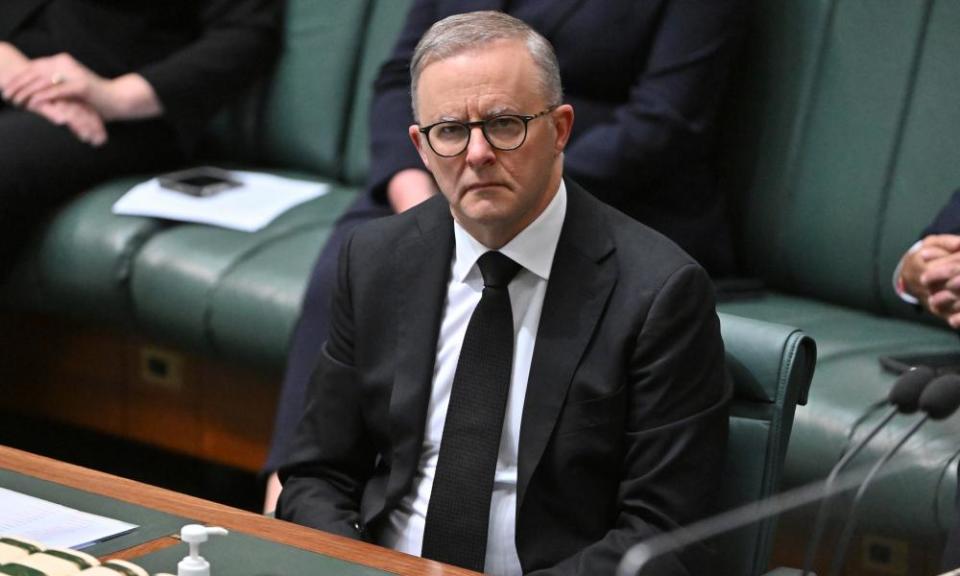Albanese can no longer blame policy delays on the Queen’s death. Next week will be a scramble to deliver on promises

Anthony Albanese has picked a difficult time to be elected prime minister, as will be clear with the resumption of parliament next week.
Whatever post-election policy momentum he enjoyed has been stalled by factors beyond his control, such as the death of Queen Elizabeth II and the demands of official grieving.
Albanese’s popularity is unlikely to suffer from participating in those observances, despite their seemingly never-ending schedule which continued Friday.
Related: Jim Chalmers announces $50bn improvement in federal budget compared to March projections
Saluting a departed monarch and meeting the new one are marginal matters compared to the real tests Albanese will face this coming week.
He will be at his most vulnerable since the 21 May election. And a political maxim says the evaluation of a PM that voters take into the Christmas break is the one they start the new year with.
A couple of bad months ending 2022 could see Albanese struggling to get traction at the start of 2023.
Economic reality will prevent any swift and substantial policy innovation, such as tax changes, to match reformist ambitions.
That reality includes warnings of crippled world markets and the persistence of a lethal pandemic which can’t be ignored even as authorities remove precautions such as mandatory mask wearing.
A president has added to his woes. Russia’s Vladimir Putin this week floated the “not-a-bluff” prospect of nuclear war in his invasion of Ukraine, which of course spread security fears over an already pessimistic world economy.
That downcast global outlook is hurting trade-reliant Australia.
“The economies of the US and Britain are in reverse; China’s has slowed markedly; and the war in Ukraine sparked an energy crisis that shows no signs of abating,” treasurer Jim Chalmers grimly listed in a piece he wrote for Friday’s The Australian.
“This is why the International Monetary Fund won’t rule out another global recession.”
Home-grown matters are the government’s immediate political difficulties. Specifically, the fact that for eight quarters in a row inflation has risen faster than wages. The buying power of stunted household incomes is being severely eroded.
And that will be the prime minister’s major challenge as he prepares for his first budget in late October. He is already foreshadowing and defending its impending unpleasantness.
In happier circumstances, Chalmers might simply ditch the priorities of previous PM Scott Morrison – scrub the ScoMo from the financial blueprint and install an Albo agenda.
However, current circumstances are far from happy and Chalmers and colleagues have warned of tight spending as welfare payments threaten to grow and revenue from income tax heads in the other direction.
Further interest rate rises are expected from the Reserve Bank board in October as part of the anti-inflation strategy, and the government is preparing its answer to complaints from punters.
“It’s for a reason,” assistant treasurer Stephen Jones said of rate rises on ABC’s RN Breakfast Thursday.
“While it is painful – it does have a hit to household budgets – the alternative is not doing nothing,” said Jones, arguing for an alternative of rate action to prevent uncontrolled inflation pushing up prices.
And repeating the brute frankness, Jones said, “This is pain. We know it’s painful.”
The costs of living are rising, and past relief measures are being labeled too expensive to reprise. For example, the 22 cents-a-litre petrol excise cut will disappear at the end of next week after it was introduced six months in the final Morrison budget.
The government argues the $3bn tax cut is too expensive to continue, but does not expect an instant jump in bowser prices because there is a stockpile of excise-free petrol.
But while the impact might be delayed, it appears certain the cost of running a family car will increase in a few months.
Highlighting the government’s predicament will be a chorus of unsympathetic voices in both houses of parliament. Albanese, in a handful of days, will go from being part of regal splendour to being the target of common abuse.
Election pledges will be revived and Albanese will face informed nagging from the confident crossbench in the House of Representatives, independent David Pocock and others in the Senate, and a renewed and reinforced Greens contingent.
He will be further reminded of an election pledge to introduce a federal integrity body this year, while all indicators are for a postponement to 2023.
Further, the government will face demands for a firm program delivering a referendum on a First Nations voice to parliament, despite prevailing divisions over what it should look like and how it would function.
These are important issues and Albanese will not be allowed to blame delays and detours on the Queen’s death.
All this will be monitored with caustic commentary by the Liberals and the Nationals.
Opposition leader Peter Dutton is expected to continue his demands for expansion of mining as a necessary revenue earner, and resist elements of prospective changes to wage settlement mechanisms.
He will do this with the snarling confrontation that is his standard operating procedure when dealing with Albanese. And some justification.
Chalmers this week revealed the anticipated deficit from the 2021-22 budget had in six months gone from around $80bn to about $30bn, thanks to commodity exports, particularly from mining.
All the above broadly identifies the political hole the government will attempt to scramble from next week.

